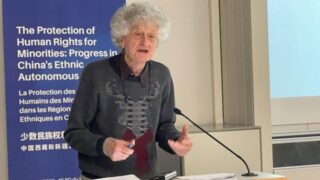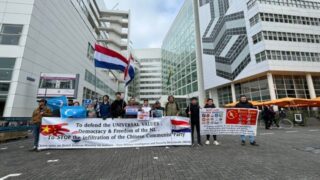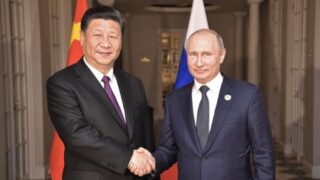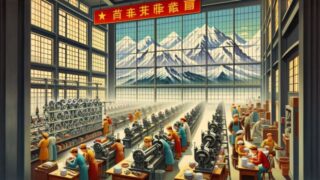The Chinese President launched a grand proposal for a new world order at the “Genocide Summit” with Putin.
by Kok Bayraq


It is clear from Xi Jinping’s speeches and article published during his visit to Russia that his definition of “neutrality” includes that weapons should not be given to Ukraine. Countries that want to be “neutral” should remain as spectators in the war between Ukraine, which has a lower population and weaker military power, and mighty Russia. Xi also does not consider sanctions against Russia rational, and defines as “reasonable” those who choose to continue their normal commercial relations with Putin. Clearly, he does not see anything immoral in strengthening Russia’s position in its war of aggression.
When presenting its 12-point peace plan, China accused the United States and Europe of having provoked Russia into war and deteriorated the situation by supplying weapons to Ukraine. In fact, when the West started supplying arms to Ukraine, the war had already begun, and the situation had already deteriorated. What could have been worse for a country than being invaded and bombed? Was it necessary to wait for the final outcome or the carnage before taking action?
Actually, in regard of peace and justice, this is the core logical difference between the two sides in the Ukrainian war, those who help Russia and those who help Ukraine. We have seen such differences many times in the past. For example, when Serbia massacred Bosnians and Kosovars, when tyrants tried to destroy the Arab Springs in blood, and the military regime in Myanmar committed genocide against the Rohingya, China always defended its “neutrality” and “reasonable business relations,” as it does today.
For China, this is not only about protecting the dictators or aggressors who started the wars, but to protect itself and to avoid facing the interrogations of justice. Because, since coming to power, the Chinese Communist Party (CCP) has waged one hundred civil wars against its own citizens under the names of “anti-three,” “anti-five,” and “anti-rightist” campaigns, killing hundreds of thousands of Chinese. In its occupied territories, China organized the March 14 Lhasa incident in Tibet and is committing Uyghur genocide in East Turkistan while defending itself in the international arena. To justify its bloodstained power, China naturally takes the side of the oppressor, not the oppressed, in all of the world’s wars.
While Xi Jinping mentioned Ukraine only three times in his article published in the Russian media, he disparaged the United States at least five times. On another occasion, he said, “In order to run the world’s affairs well, a man must first of all conduct his own affairs well.” This is an allusion to domestic problems in the United States as well as in the rest of the democratic world.
At this point, as always, Xi refers to the wars in Iraq and Afghanistan initiated by the United States. If these wars were wrong, perhaps other countries can blame the United States—but not China. While the United States eventually withdrew its military forces from these territories, China still occupies East Turkistan, Tibet, and Southern Mongolia, and is not ashamed to pretend that these areas “have been part of China since ancient times.”
Xi did not go to Moscow to promote peace, but to put together the strength of Russia and China to advance the ongoing genocides in East Turkestan and Ukraine into their next stage. The problem he faces and the reason Xi went to Moscow is not Ukraine. It is the United States, which annoys both Xi and Putin by trying to stop their genocides.


Clearly, Joseph Bosco, former China Country Desk Officer for the United States Secretary of Defense, had the right to call Xi and Putin’s meeting a “Genocide Summit.”
It is highly significant that Xi is presenting his unique views of “neutrality” and “rationality” as “global” views. Who comprises this global community?
Since Xi Jinping did not utter these words based on any investigation or survey, we can conclude the following logically. Of course, those who demand such “neutrality ” and “rationality” are Putin, who poisoned his opponents; Mohammed bin Salman Al Saud, who dismembered an independent journalist; Kim Jong-un, who killed members of his own family; and Cuba leader Miguel Díaz-Canel, successor to Castro, who continues to silence and persecute any voice for democracy in his country.
Xi Jinping’s audacity to present these views as “global” is a small but important part of the new world order that he is advocating. Xi’s doctrine implies that all dictators are free to impose their ideas, desires and interests and to present them as part of a superior, more advanced “global” order. China’s history in the last seventy years is full of tragedies caused by this “order.”
Since 1949, the CCP has dealt heavy blows to the well-off and politically conservative classes of Chinese society, businesspersons, and landowners. None of these movements were called Party views; they were presented as the views, desires, and hopes of the Chinese people. In fact, the vast majority of these actions were taken to eliminate Mao Zedong’s opponents, and the remainder were designed to eliminate Ding Xiaoping’s and Xi Jinping’s critics. The Uyghur genocide, which reached its peak in 2017, was also declared a “people’s war against terrorism.”


How could this deceptive, violent, and humiliating system of the CCP, which has been going on for nearly a century, be made presentable on the international stage? By insisting on the CCP’s domestic “success.” The Chinese people became accustomed to this system through systematic and persistent repression.
Additionally, the CCP never faced international punishment for its crimes, including the June 4th Tiananmen massacre, the Lhasa massacre, the escalation in the Uyghur genocide in the last six years, and its responsibility for the COVID-19 pandemic, which killed more than three million people worldwide. A lack of accountability gave Xi Jinping enough confidence to commit crimes around the world. Xi’s stance at the Genocide Summit is a further indicator of this confidence.
As the situation is so clear, listening to China’s lectures about peace and justice and expecting it to solve any international problem is not only foolish, but also delusional.
If the decisions and results of this Genocide Summit—including China’s deception of the world on its real stand on the Ukraine issue, the support of Russian aggressors, and normal business with war criminals, including probable supply of weapons to Russia—are not punished, Xi Jinping will gain more confidence. Thereafter, we will hear more surprising “global views” from him , a massive propaganda never heard before on the world’s stage.









